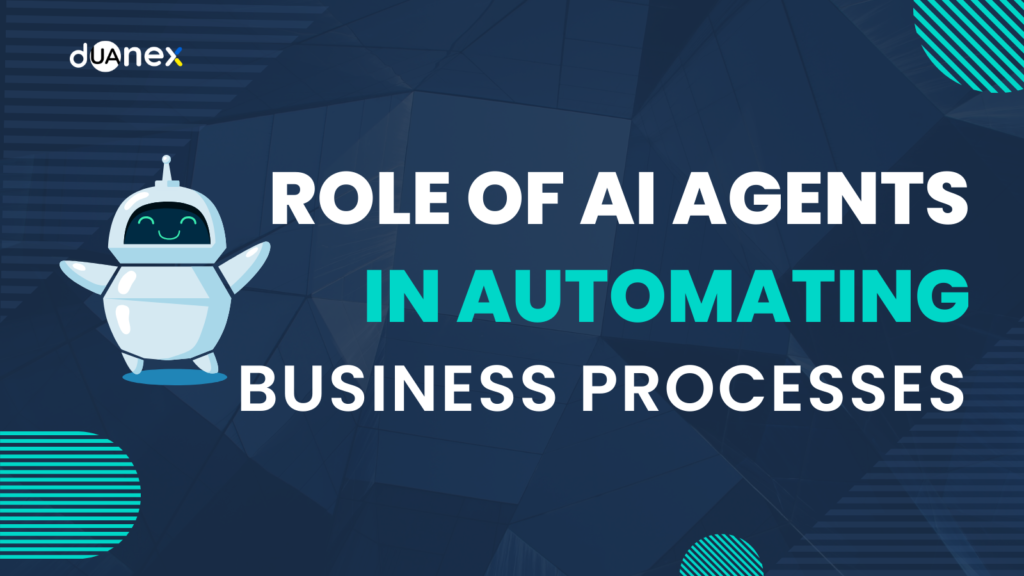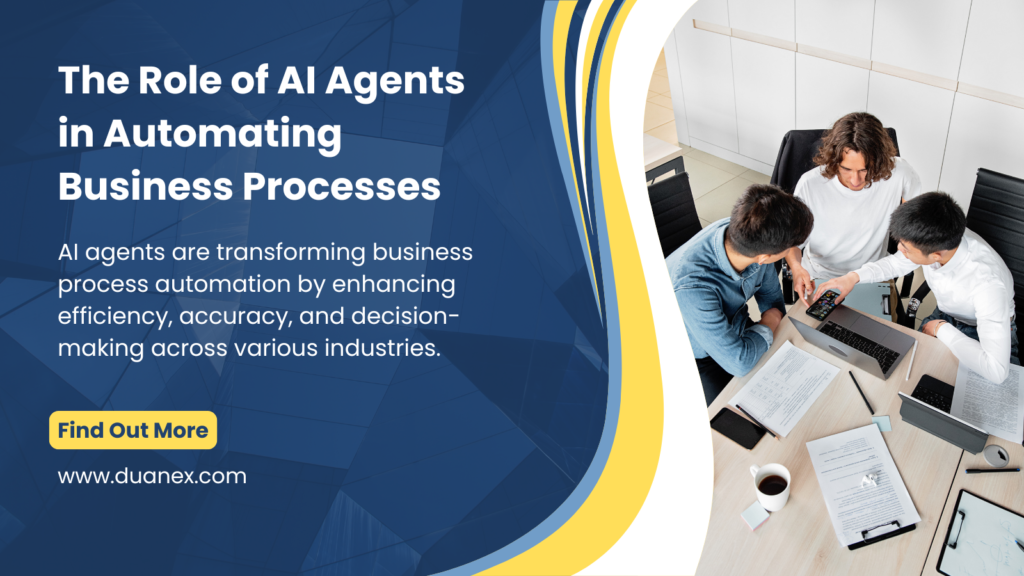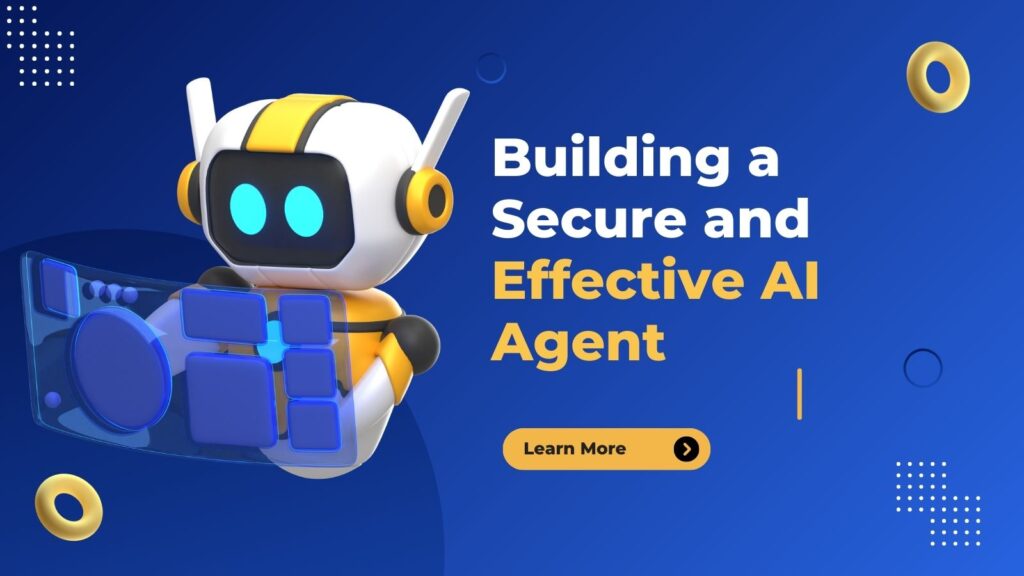How to Create a Transportation App: Features,
Price, and Implementation Steps
29 Aug 2023
18 min

CTO

Technical Writer
Artificial intelligence in business has revolutionized the way businesses operate, bringing efficiency, accuracy, and scalability to various domains. AI agents and bots are the go-to solutions for businesses seeking ways to transform their processes, whether automating complex workflows, eliminating repetitive tasks, or enabling organizations to make data-driven decisions with minimal human intervention. In this article, we explore the impact of AI agents in automating business processes across different fields, including finance and banking, customer services & support, human resources, and IT service management.

Understanding AI Agents in Business Process Automation
AI agents are intelligent software programs capable of making decisions and executing tasks autonomously or semi-autonomously. Artificial intelligence in business leverages machine learning, natural language processing (NLP), robotic process automation (RPA), and other AI technologies to optimize business workflows.
Some common types of AI agents used in business automation include:
- Rule-based agents: Follow predefined rules to perform specific tasks.
- Machine Learning Agents: Improve over time by learning from data patterns.
- Conversational Agents (Chatbots): Use NLP to interact with users and resolve inquiries.
- Autonomous Decision-Making Agents: Analyze complex data sets and make real-time decisions.
By integrating artificial intelligence in business processes, organizations can enhance efficiency, reduce operational costs, and improve overall decision-making.
AI Agents in Finance and Banking
The financial sector has seen a significant transformation due to AI-driven automation. AI agents streamline operations, enhance security, and improve customer experiences in banking and finance.
1. Fraud Detection and Risk Management
AI agents analyze transaction patterns in real time to identify suspicious activities and potential fraud. Machine learning models can detect anomalies and flag fraudulent transactions before they cause major financial losses.
2. Automated Customer Support and Chatbots
Banks and financial institutions use AI-powered chatbots to handle customer inquiries, process transactions, and provide financial guidance. These bots reduce response times and improve customer satisfaction. We suppose you have heard about Bank of America’s Erica, AI-powered financial assistant, who quickly provides customers with info about their accounts and helps reduce call center load significantly.
For more information about AI agents in customer support, check our copy on “AI Agents in Customer Support: Real-World Use Cases and Benefits”
3. Credit Scoring and Loan Processing
AI agents analyze vast amounts of customer data to assess creditworthiness more accurately than traditional credit scoring methods. This enables faster loan approvals and better risk assessment for lenders.
4. Algorithmic Trading and Portfolio Management
AI-powered trading algorithms analyze market data and execute trades at optimal times to maximize returns. Robo-advisors use AI to provide personalized investment strategies for clients based on their financial goals and risk tolerance.
5. Regulatory Compliance and Reporting
AI agents assist financial institutions in complying with complex regulatory requirements by automating document processing, risk assessment, and audit reporting. Natural language processing tools extract insights from legal documents to ensure compliance.
AI Agents in Human Resources
The human resources (HR) function encompasses various administrative and strategic tasks, including recruitment, employee engagement, payroll processing, and compliance management. AI agents enhance efficiency in HR operations by automating labor-intensive processes and improving decision-making.
1. AI-Powered Recruitment and Hiring
AI-powered interviews are not a myth anymore! AI-driven applicant tracking systems (ATS) filter job applications, shortlist candidates, and match resumes with job descriptions. Conversational AI chatbots conduct initial screening interviews, assess candidate suitability, and schedule interviews.
Want to know how to prepare for AI-powered interview? We’ve got you covered in our article about “AI Interviews”.
2. Employee Onboarding and Training
Virtual AI assistants guide new employees through onboarding processes, providing information about company policies, benefits, and workflows. AI-powered learning platforms recommend personalized training programs based on employee skill gaps and career progression.
3. Employee Engagement and Sentiment Analysis
AI-powered sentiment analysis tools assess employee feedback from surveys, emails, and chat interactions to gauge employee satisfaction and workplace morale. This enables HR teams to take proactive measures to improve employee experience.
4. Payroll and Benefits Administration
AI-powered RPA solutions automate payroll calculations, tax deductions, and benefits administration, reducing errors and ensuring compliance with labor regulations.

AI Agents in IT Service Management
AI-driven IT service management (ITSM) solutions help organizations enhance IT operations, optimize incident resolution, and improve user support services.
1. Automated IT Support and Chatbots
AI-powered virtual assistants handle routine IT support queries, troubleshoot common technical issues, and escalate complex cases to human agents. NLP-enabled chatbots provide 24/7 support, reducing resolution times and improving user satisfaction.
2. Security Threat Detection and Response
AI agents continuously monitor network traffic, detect cyber threats, and prevent security breaches. Machine learning algorithms analyze patterns in cyberattacks and provide real-time threat intelligence to cybersecurity teams.
3. IT Asset Management and Optimization
AI-driven asset management tools track hardware and software usage, optimize resource allocation, and predict equipment maintenance needs, leading to cost savings and enhanced IT efficiency.
Future of AI in Business Process Automation
Advancements in machine learning, banking field, and service management will shape the future of AI-driven business automation. Key trends include:
- Autonomous AI Agents: AI-powered decision-making systems that operate with minimal human intervention.
- AI-Driven Business Insights: Enhanced analytics capabilities that provide real-time business intelligence.
- Conversational AI Evolution: More sophisticated AI chatbots with human-like interactions.
As AI technology evolves, businesses must stay agile and leverage AI-driven automation to maintain a competitive edge in the digital era.
Word from Duanex
AI agents are transforming business process automation by enhancing efficiency, accuracy, and decision-making across various industries. From finance and banking to human resources and IT service management, AI-driven automation is optimizing workflows and enabling businesses to scale operations seamlessly. While challenges such as data privacy, system integration, and ethical considerations must be addressed, the future of artificial intelligence in business promises significant opportunities for innovation and growth. Organizations that embrace AI-driven automation today will be well-positioned to thrive in the evolving digital landscape.

